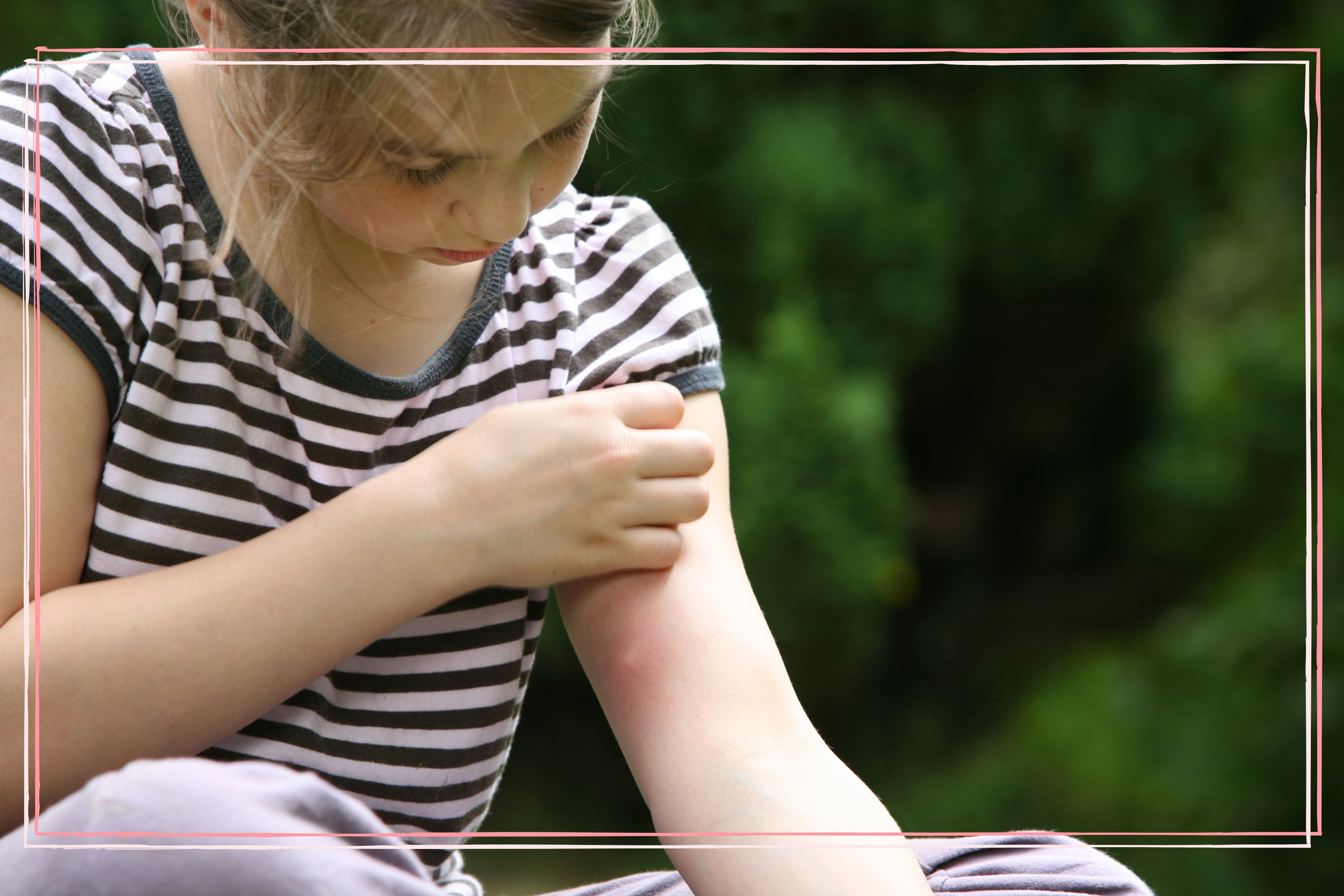Common types of insect bites in the UK and doctor advice on how to treat them and stop your child itching
Two doctors share their advice on how to identify different types of insect bites in the UK and what red flag reactions and symptoms to look out for.


Better weather means more opportunities for outdoor adventure with your children, but that also means you might be more likely to have to deal with different types of insect bites or stings.
It is more common for people to get bitten or stung by insects in the warmer months of the year, and last summer the NHS reported triple the number of those seeking advice on bites and stings via its website compared to the previous year. According to the government, climate change is causing the UK’s insect populations to alter in size.
We spoke to Dr José Costa, a senior consultant paediatrician specialising in children’s allergies, and GP Dr Luke Powles, who shared their advice with us on the main types of insect bites and doctor-approved treatments you can use at home to help soothe the bite and stop it itching. The doctors also shared their insights as to why some children are more at risk of being bitten, and the red flags to look out for so you know when to take your child to see the GP to get their insect bite looked at by a doctor.
The information in this article is for general purposes only and does not take the place of medical advice. It is essential to be guided by your GP and take note of official NHS advice. As a parent, you know your child better than anyone and you should always trust your own judgement. If you are at all in doubt or worried about your child's symptoms, or their symptoms get worse or are not getting any better, you should contact your GP.
If your child is limp, floppy or not responding like they normally do, their lips, mouth, throat or tongue suddenly become swollen, they are breathing very fast or struggling to breathe, their skin, tongue or lips turn blue, grey or pale, they become very confused, drowsy or dizzy, or faint, you should call 999 or take your child to A&E. These can be signs of a serious allergic reaction and may need immediate treatment in hospital.
The most common types of insect bites in the UK
"The main types of insect bites - or stings - expected during the summer will come from mosquitoes, flies, fleas, ticks, honeybees, bumblebees, wasps, hornets, yellowjackets, harvester ants and fire ants," says Dr Costa. Similarly, Dr Powles adds that midges, mites, bedbugs and horseflies may cause problems too.
Dr Costa says, "The signs [of an insect bite] often vary, depending on what has bitten or stung your child," but the main symptoms of an insect bite or sting are a small, swollen lump on the skin and pain at the site of the bite. The NHS notes, "The lump may look red. It may be more difficult to see on black or brown skin, but you should be able to feel it."
Parenting advice, hot topics, best buys and family finance tips delivered straight to your inbox.
Dr Costa and Dr Powles explained what the following different types of insect bites might look like:
- A mosquito bite - This will look like a hive or welt - being raised, mildly pale in the centre and quite itchy. These symptoms tend to present after a few hours.
- A bee, honeybee, wasp, hornet, or yellow jacket sting - This will look like a mosquito bite, but it can swell much more and tends to be quite painful. Symptoms usually start immediately and progress, mainly with increased swelling.
- Red ants - Red ant bites will leave a red area with a central white spot. The sting tends to be quite painful, burning and itchy.
- Flies - The symptoms of a fly bite will be similar to the red ant but will not be painful.
- Midges - Midge bites can be very itchy and swell up to form blisters filled with liquid - they’re usually found in groups on the skin.
- Ticks - Tick bites can be spotted by the tick that’s attached themselves to the skin. Sometimes, but not always, a bullseye-shaped rash can develop around the site - if it does, seek medical advice as it could be a symptom of Lyme’s disease, which needs antibiotics.
- Fleas - Flea bites are commonly found below the knee. They appear as small, raised swellings, often in lines or clusters.
- Mites - In contrast to flea bites, mite bites are very itchy, leading to lumps and sometimes blisters on the skin.
- Bedbugs - Bedbug bites don’t usually hurt but they may form on your child’s face, neck, hands or arms. If it’s not your first time with bedbugs, they may cause irritation.
- Horseflies - Horsefly bites are large in size - they’re painful and may end up bleeding, which can lead to infection.
The NHS provides pictures of common insect bites, stings and rashes here. If you or your child have been bitten or stung by an insect and were stung in the mouth or throat, or near the eyes, were stung more than once, or a large area around the bite or sting becomes red and swollen, you should ask for an urgent GP appointment or call NHS 111.
How long do insect bites last?
Insect bites or stings are not usually serious and get better in a few days, but if you or your child have been bitten or stung by an insect and the symptoms get worse or are not getting any better, you should see your GP as soon as possible.
"If the bite doesn’t get better after a few days, or becomes worse, speak to a healthcare professional," says Dr Powles. "Additionally, it’s important to seek advice if your child has been bitten around their eyes, mouth or throat."
"Bites usually last anywhere between a few days and up to a week, with scabs from scratching possibly lasting a bit longer," explains Dr Costa.
"If the bite has become infected, you might have a skin reaction lasting for a couple of weeks." If you think an insect bite has become infected you should seek medical advice straight away.
How to treat insect bites at home
The NHS says that you, "can often treat an insect bite or sting without seeing a GP" and the doctors we spoke to shared their advice on how to treat insect bites at home.
"Start with simple measures like washing the sting or bite area," advises Dr Costa. "Applying refreshing creams like Eurax - or ones that are chamomile, mint or aloe vera-based - can help to decrease the itch and swelling." He adds: "Occasionally, pain relief - like ibuprofen or paracetamol - can also be given to ease symptoms."
Dr Powles agrees saying, "If your child is struggling to leave the bitten area alone, it may be useful to give them the medication to offer relief. It can be given in liquid or tablet form, depending on your child’s age." Consult with your GP or pharmacist first before giving your child pain relief.
"You can also give them an antihistamine, as this will also help with the itch and swelling," says Dr Costa. Antihistamines are medication used to relieve symptoms of allergies - such as reactions to bites - but should only be given to children with advice first from your doctor and they are not suitable for babies.
To help treat swelling from insect bites Dr Powles recommends, "use a cold compress - like a clean cloth soaked in cold water - and apply to the area. If you can, elevate where your child was bitten as this may help to lower swelling."
How to stop insect bites itching
Finding a way to stop your child itching an insect bite will not only make them more comfortable but is also important to stop the bite becoming infected. Dr Powles explains, "Helping your kid avoid scratching the area can reduce the chance of the bite becoming infected. If your child is finding their bite irritating, applying an unscented moisturising cream to their skin might help minimise the itching sensation."
"Regular bathing may also soothe irritation, along with dressing them in loose clothing and keeping their nails trimmed short to curb their temptation to scratch."
Dr Costa adds: "Applying refreshing creams like Eurax - or that are chamomile, mint or aloe vera-based - can help to decrease the itching sensation. You can also give them antihistamines."
When to see a doctor
Most bites should heal and their symptoms ease with time, however the NHS states that you should ask for an urgent GP appointment if you've been bitten or stung by an insect and:
- your symptoms get worse or are not getting any better
- you were stung in your mouth or throat, or near your eyes
- you have tummy pain and are being sick
- you feel dizzy or lightheaded
- a large area around the bite or sting becomes red and swollen
- you have a high temperature and swollen glands
- you were stung more than once
- you've had a serious allergic reaction to an insect bite or sting before
"You should see a doctor is if there is increased swelling – in case this is an allergic reaction," warns Dr Costa. "If you find a tick and cannot remove it, it is wise to see a doctor so that the head can be got rid of before it causes an infection."
Dr Costa adds: "You should also be concerned if symptoms present in different areas to where the insect bite happened, and it’s important to keep an eye out for any developments over the coming weeks.
"For example, certain tick bites can lead to Lyme disease, encephalitis and meningitis. It is important to note that the lesion from a tick can appear between one and four weeks after the bite – and in rare cases, showing up three months later. So often, parents don’t make a link between an initial bite and symptoms later on."
There are other instances in which you should seek advice from your child’s GP or another specialist fairly urgently. "Including if the bites become particularly swollen, blistered or start oozing pus," urges Dr Powles. "Additionally, you should make an appointment if your child has had an allergic reaction to an insect bite before or experiences symptoms such as a large red and swollen area forming around where they were bitten.
"Additionally, look out for whether they are developing a high temperature and swollen glands, and look or feel unwell, start experiencing tummy pains, nausea or being sick, dizziness or light-headedness and developing a rash after a tick bite."
"The main thing to look for is whether there is a discharge from the site where the bite or sting happened," advises Dr Costa. "This indicates an infection, and whether your child might need oral antibiotics.
"If the bite is on the upper body - such as the arms, chest, back or shoulders - and there is significant swelling around the area, spreading progressively towards the head, this is a concern and indicates a significant allergy. In this case, give them antihistamines and take them to A&E or call ‘999’.
"Swelling of the throat, with shortness of breath and difficulty breathing, is a sign of anaphylaxis. In this case, do not give your child antihistamines, but take them to the nearest A&E or call ‘999’."
There are other instances when you should take the same measures. "They might need hospital treatment, if they become non-responsive or floppy, find it difficult to focus or lift their head, and if they feel faint and can’t be woken back up," warns Dr Powles. "Be alert to changes in the colour of their lips, tongue, palms or soles of their feet. If they become grey or paler, it could be a sign of circulation problems. They may also become disorientated or confused."
The NHS advises that you call 999 if:
- your lips, mouth, throat or tongue suddenly become swollen
- you're breathing very fast or struggling to breathe (you may become very wheezy or feel like you're choking or gasping for air)
- your throat feels tight or you're struggling to swallow
- your skin, tongue or lips turn blue, grey or pale (if you have black or brown skin, this may be easier to see on the palms of your hands or soles of your feet)
- you suddenly become very confused, drowsy or dizzy
- someone faints and cannot be woken up
- a child is limp, floppy or not responding like they normally do (their head may fall to the side, backwards or forwards, or they may find it difficult to lift their head or focus on your face)
Additional questions about insect bites answered by doctors
Do we know why some children are more likely than others to be bitten?
"Certain factors make children more susceptible to mosquito bites," notes Dr Costa. "For example, since mosquitoes focus on body heat to choose their target and children have a higher metabolism, they will be more attracted to them than adults. There’s also evidence of some relationship between children with type O blood and being more prone to mosquito bites, although the exact reason is unknown."
However, for most bites, the likelihood tends to be based on increased proximity to the insects themselves. "Children may be more likely to be bitten if they spend more time playing outdoors," points out Dr Powles. "Additionally, your risk of coming across midges and mosquitos is greater at dusk and dawn, and it is also thought that being hot and sweaty makes you a more appealing target."
Is there a way to prevent children from getting insect bites?
"One of the best ways to protect your child from insect bites and stings is to cover exposed areas or dress them in lighter-coloured clothing without flower patterns," advises Dr Costa. "Applying insect repellent can also be very useful, and avoiding perfumes, creams, lotions, shampoos and soaps with a stronger scent. As a general rule, avoid areas where insects might be more frequent."
Dr Powles agrees: "Try to reduce the chance of your child facing situations that make insect bites more likely. If they’re playing outdoors, keep them away from long grass to reduce the chance of tick bites. Avoid outdoor play at dawn or dusk, and apply flea treatment to pets regularly. If you have bedbugs, wash bedding and clothing at high temperatures, and vacuum regularly to prevent bedbugs and fleas."
The information on GoodTo.com does not constitute medical or other health advice or diagnosis and should not be used as such. Although GoodtoKnow consults a range of medical experts to create and fact-check content, this information is for general purposes only and does not take the place of medical advice. Always seek the guidance of a qualified health professional or seek urgent medical attention if needed.
Our experts

Dr José Costa is a senior consultant paediatrician, specialising in research and medical guidance on skin conditions such as eczema, as well as childhood food allergies, hayfever and asthma. With over 16 years of experience in paediatrics and 12 years in paediatric allergy, he has worked in both the NHS and the private sector, as part of his own specialist Children’s Allergy Clinic.

Dr Luke Powles is the associate clinical director at Bupa Health Clinics. Previously, he was the lead physician for Bupa’s health clinics in London’s Canary Wharf and King's Cross. Before joining Bupa, he was an NHS doctor for nearly 12 years working in both hospital medicine and general practice. He has a passion for preventative medicine.

Lauren is a freelance writer and editor, with more than eight years of experience working in digital and print journalism. She has penned news and features for titles including Women's Health, Daily Telegraph, Cosmopolitan, The Times, Stylist, The Guardian, Woman & Home, Dazed, The Sun's Fabulous, Yahoo UK and Grazia.
Lauren specialises in covering health and wellness topics—ranging from nutrition and fitness, to health conditions and mental wellbeing. She also runs a weekly newsletter called Well, Actually..., which has been named a Substack Featured Publication.